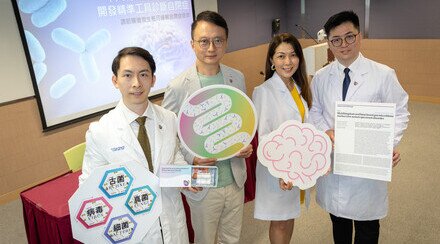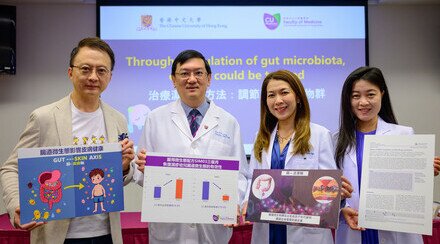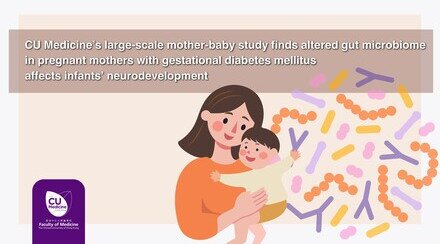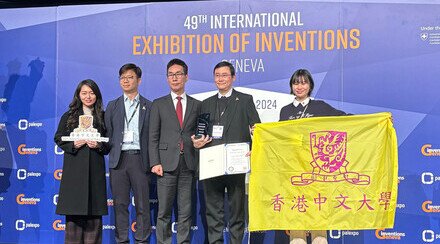CUHK Discovers Children with Autism Have Delayed Gut Microbiome Maturity and Identifies Faecal Bacterial Markers for Autism
The Faculty of Medicine of The Chinese University of Hong Kong (CU Medicine) reports a ground breaking discovery that children with autism spectrum disorder (autism) showed delayed gut microbiome maturity compared with typically developing children. They had an underdeveloped gut bacteria that is not related to their diet. The research team examined stool samples of children with autism and identified significantly fewer bacteria linked to neurotransmitter activities and five unique species of bacteria that are not typically found in the guts of children without the condition. These findings recently published in an international medical journal Gut highlights the potential of non-invasive bacteria markers for early diagnosis and treatment for children with autism.

CU Medicine reports a ground breaking discovery that children with autism show delayed gut microbiome maturity compared with typically developing children.
(From left) Professor Francis CHAN, Dean of Medicine and Director of the Centre for Gut Microbiota Research; Dr. Dorothy CHAN, Clinical Associate Professor (honorary), Department of Paediatrics; Dr. Sandra CHAN, Clinical Associate Professor, Department of Psychiatry; and Professor Siew NG, Associate Director, Centre for Gut Microbiota Research, CU Medicine.
Gut microbiome has a close connection with the pathogenesis of autism
Autism is a neurodevelopmental disorder characterised by the impairment of communication, the use of language and social interactions. Like most disorders that affect the brain, there is no one cause. It is believed that autism develops from a combination of genetic and environmental factors. Emerging research suggest that gut microbes communicate with the brain, dubbed the microbiome-gut-brain axis, and may account for the symptoms of autism. The prevalence of autism is approximately 1% in developed countries1, hence based on this estimation, there will be over 70,000 people with this condition in Hong Kong, and incidence has been on the rise in recent years.
Dr. Sandra Sau Man CHAN, Clinical Associate Professor of the Department of Psychiatry at CU Medicine elaborated, “Apart from genetic factors, it has been suggested that the gut microbiome may have a part to play in autism spectrum disorders. The evidence suggests that the pathway between gut bacteria and the central nervous system, referred to as the gut–brain axis, has a profound effect on social behaviours. Physicians and researchers are working hard to identify modifiable factors such as the microbiome which shall bring hope to children with autism and their families.”
Dr. Dorothy Fung Ying CHAN, Clinical Associate Professor (honorary) of the Department of Paediatrics at CU Medicine added, “Diagnosis of autism is currently carried out through regular developmental assessment for young children. Further clinical evaluation will only be offered to children when they show signs of atypical social and language development which is not satisfactory. The earlier autism is diagnosed and thus treated, the more effective and long-lasting the effects are. Research has shown that if children get early intervention, it’s more likely that they won’t need intensive support in elementary school and beyond”.
Emerging studies suggest that the gut microbiome may have a significant part to play in autism. The evidence suggests that the pathway between gut bacteria and the central nervous system, referred to as the gut–brain axis, has a profound effect on social behaviours.

Dr. Sandra Chan points out that there is evidence suggesting the gut–brain axis has a profound effect on social behaviours.

Dr. Dorothy Chan remarks in the press conference that there are researches showing if children get early intervention, it’s more likely that they will not need intensive support in elementary school and beyond.
Children with autism had significantly fewer gut bugs linked to neurotransmitter activity
CU Medicine researchers tested whether children with autism harbour gut microbiome that differs significantly from that of typically developing children, which might facilitate early diagnosis or treatment. They compared the range, volume, and associated functions of bacteria in the stool samples of 128 Chinese children aged 3-6, half of whom had autism spectrum disorder. Below are the major findings:
- The gut microbiome composition in children with autism differed substantially from that of children without the condition, with five bacterial species largely accounting for the difference. The sensitivity of these bacterial markers to identify autism is over 80%.
- Several Clostridium species enriched in children with autism. Clostridia species have been linked with autism via the production of clostridial toxins which can damage the central nervous system.
- Bacteria associated with neurotransmitter activities were substantially reduced in children with autism.
- The amount and abundance of gut microbiota shall grow with age but that of children with autism is abnormally developed and lags that of age-matched peers.

Prof. Siew Ng states that the development of microbial communities within the gastrointestinal tract during childhood represents a critical window of human growth and health.

Professor Siew Chien NG, Associate Director of the Centre for Gut Microbiota Research at CU Medicine remarked, “Our study shows for the first time that the gut microbiota of children with autism is abnormally developed and lags that of age-matched peers. As the development of microbial communities within the gastrointestinal tract during childhood represents a critical window of human growth and health, shifts in the gut microbiota during early life development may have important functional roles in the pathogenesis of autism and thus warrants extensive investigation.”
Professor Francis KL CHAN, Dean of Medicine and Director of the Centre for Gut Microbiota Research at CU Medicine, concluded, “We are hopeful that our findings could resolve the unmet need of autism diagnosis. Our study supports the potential role of non-invasive prediction of autism based on faecal bacteria markers and age-related bacteria development profile. Future therapeutics targeting reconstitution of gut microbiota in early life and increasing abundance of neurotransmitter-synthesised bacteria should be explored for autism spectrum disorder.”
The study was supported by the Health and Medical Research Fund of the Food and Health Bureau and InnoHK of the Innovation and Technology Commission of the HKSAR government.
1 Sun, X., Allison, C., Matthews, F.E. et al. Prevalence of autism in mainland China, Hong Kong and Taiwan: a systematic review and meta-analysis. Molecular Autism 4, 7 (2013). https://doi.org/10.1186/2040-2392-4-7


























